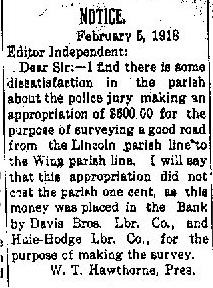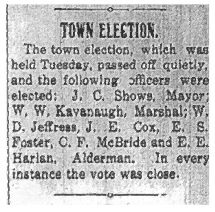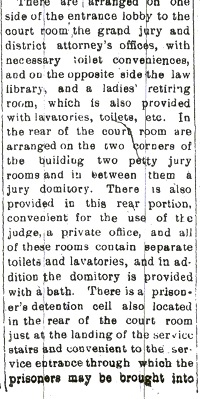


Notice
February 5, 1913
Editor Independent:
Dear Sir:--I find there
is some dissatisfaction in the parish about the police jury making an
appropriation of $600.00 for the purpose of surveying a good road from the
Lincoln parish line to the Winn parish line. (will say that this appropriation
did not cost the parish one cent as this money was placed in the bank by Davis
Bros. Lbr. Co., and Hoie(?) Lbr. Co. for the purpose of making the survey.
W.
T. Hawthorne, Pres.

TOWN ELECTION.
The town election, which was held Tuesday, passed off
quietly, and the following officers were elected: J. C. Shows, Mayor; W. W.
Kavanaugh, Marshall; W. D. Jeffress, J. E. Cox, E. S. Foster, C. F. McBride, and
E. E. Harlan, Alderman. In every instance the vote was close.

[Image of the middle part of the article is not available.]

[Image of the last part of the article is not available.]
Contributor: Unknown
COURT HOUSE COMPLETED
None Finer in the State - Police Jury Accepts
the Building
The Police Jury of Jackson parish met here Monday, composed
of the following members: G. W. hearn, L. S. Zeigler, B. H. Brown, W. L.
Dickerson and B. F. McBride. Edwin Orr, who recently moved to Glenmora, near
Alexandria, being absent. After reviewing the work on the Court House the
Jury, together with the parish architect, W. L. Stevens, accepted the building
after being thoroughly convinced that every detail had been carried out
according to contract.
Following is a partial description of the
building:
As the design implies, this building is Corinthian in style of
architucture. Its overall dimensions are 80x120. Its construction is fire proof
throughout, the floors, framing, etc., being of re-inforced concrete and the
walls of stone, terra cotta or brick. The base buttresses, columns, pedestals,
and in fact all ornamental features on the building are of Indianna Bedford
stone, while the cornices, pediments, etc., are built of terra cotta. The dome
is of copper and the main roof slate.
This house with its monolithic
re-enforced concrete construction erected on such a foundation should endure for
ages, and every care has been exer- . . .
There are arranged on one side of the entrance lobby
to the court room the grand jury and district attorney's offices, with necessary
toilet conveniences, and on the opposite side the law library, and a ladies'
retiring room, which is also provided with lavatories, toilets, etc. In the rear
of the court room are arranged on the two corners of the building two petty jury
rooms in between them a jury domitory. There is also provided in this rear
portion, convenient for the use of the judge, a private office, and all of these
rooms contain separate toilets and lavatories, and in addition the domitory is
provided with a bath. There is a prisoner's detention cell also located in the
rear of the court room just at the landing of the service stairs and convenient
to the service entrance through which the prisoners may be brought into . . .
1904 Jan 15. News From Abroad. The Jonesboro Independent gives us the folloowing bit of information: "Mr. J. L. Griggs of Hood's Mill just the other day sold to Sheriff B. W. Bailey of Winnfield a bald eagle which he had kept and tamed. This eagle was caught when it was quite small by a brother of Mr. Griggs. Mr. Griggs took it and kept it until it was grown. It measured 6 feet and 2 inches from tip to tip."
1913 Jan 24. ... Mr. and Mrs. Dickerson and baby left the same day for Chatham to assume his duties as parish school superintendent of Jackson parish, and we send our good wishes along with him. ...
1917 May 19. Mr. J. A. Hyde returned from Jonesboro, Jackson parish, where he was a character witness in the case of Pet Morgan, a negro, charged with the murder of a deputy sheriff at Atlanta.
 1918 May 03
1918 May 03
School at Vernon Destroyed by Fire
State Superintendent T. H. Harris has just received notice from Parish Superintendent Dickerson of Jackson parish that the Strange Industrial School, a negro institution, valued at more than $4,000, was burned by incendiaries. The school, which was located about three miles from Vernon, employed seven teachers, was attended by more than two hundred pupils ranging in age from 8 to 20 years, and had in connection with it an eighty-acre tract of land, more than half of which is under cultivation by the pupils. In addition to this school tract, home gardens were being cultivated. The aughorities are investigating. . . .
Extracted 25 Jun 2020 by Norma Hass, image courtesy of Chronicling America
1919 Dec 20. And So It Goes. The Stubbs Headquarters sent a letter to Mr. J. H. Irvine at Wyatt, in Jackson Parish, urging the fomring of a Stubbs Club there. The Iberian has a copy of Mr. Irvine's reply, which reads as follows, "Only know of one Stubbs man here. About $3.00 would organize him allright. Yours very respectfully (signed) J. H. Irvine."
1920 Apr 15. Eros, in Jackson parish was laid waste by a windstorm, but htere was no loss of life reported.
1920 Apr 24. Ruston. At Reed's mill, ten miles southwest of here, in Jackson parish, hail three inches in diameter fell injuring stock and doing much damage. The wind at that place developed into a gale unroofed about thirty houses.
Copyright © 1996- The USGenWeb® Project, LAGenWeb, Jackson Parish